Mathea Ford's Blog, page 74
February 8, 2016
Avoiding End Stage Renal Disease
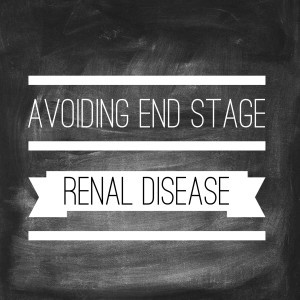 End stage renal disease is the final stages of chronic kidney disease. At this stage, in order to continue living and functioning, transplant or dialysis is required. No one wants to reach this stage and hear the words that their kidneys have finally failed. It is a life threatening and uncomfortable condition to live with, not to mention everything that needs to be done at this point to keep you alive.
End stage renal disease is the final stages of chronic kidney disease. At this stage, in order to continue living and functioning, transplant or dialysis is required. No one wants to reach this stage and hear the words that their kidneys have finally failed. It is a life threatening and uncomfortable condition to live with, not to mention everything that needs to be done at this point to keep you alive.The good news is that end stage renal disease can be avoided. It will take work, perseverance, and the willingness to be stricter on yourself than you ever thought possible, but it is possible. You cannot restore the lost function of your kidneys but you can slow, or even stop, the progression of kidney disease. The answer is easy, but the follow through can be quite difficult.
Strict Dietary Changes
The most important key to slowing the progression of your chronic kidney disease and avoiding end stage renal disease is your diet. Keep in mind that every single bit of food or drink that you swallow eventually is filtered through your kidneys. As you lose function, it is harder and harder for your kidneys to keep up with their primary job of filtering out excess waste, fluid, and toxins.
A strict, healthy, kidney safe diet takes the pressure off of your kidneys and allows them to function at their best capacity without additional strain. If your kidneys do not have to work as hard to filter out all of the excess waste and other bad stuff, they are better able to perform the multiple other functions they are meant to perform.
Diet alone makes the biggest difference when treating chronic kidney disease. It is strict dietary changes that are the answer to avoiding end stage renal disease. This will require a lot of willpower and knowledge of what foods are considered kidney safe, but it is your best chance.
Healthy Lifestyle Choices
Along with strict dietary changes, healthy lifestyle choices will help you to maintain the best remaining function of your kidneys. This means getting regular exercise as your doctor recommends and permits. This also means cutting out alcohol and not smoking.
Treatment Follow Through
It isn’t enough to treat your condition with diet and lifestyle changes. You will also need to see your doctors regularly to follow up with how your treatments are going. You may need medications and possibly even counseling. Keep in mind that living with a chronic illness such as kidney disease isn’t easy for anyone, and you should take all the help you can get to avoid kidney failure.
Avoiding end stage renal disease will take more will power than you may even realize you have, but it can be done. You can avoid ever needing dialysis or transplant. The most important key is a strict diet, followed by a healthy lifestyle and medical intervention. You can slow or even stop the progression of your chronic kidney disease and avoid end stage renal disease with this information. For more information, click here.
<<<>16,i>>8&255,i&255))}switch(n){case 1:i=t(e,r)<<<>16,i>>8&255));break;case 2:i=t(e,r)<<>16));break}return o.join('')};
base64.getbyte=function(e,t){var n=e.charCodeAt(t);if (n>255){throw base64.makeDOMException()}return n};
base64.encode=function(e){if (arguments.length!==1){throw new SyntaxError('Not enough arguments')}var t=base64.PADCHAR;var n=base64.ALPHA;var r=base64.getbyte;var i,s;var o=[];e=''+e;var u=e.length-e.length%3;if (e.length===0){return e}for (i=0;i<<>18));o.push(n.charAt(s>>12&63));o.push(n.charAt(s>>6&63));o.push(n.charAt(s&63))}switch(e.length-u){case 1:s=r(e,i)<>18)+n.charAt(s>>12&63)+t+t);break;case 2:s=r(e,i)<<>18)+n.charAt(s>>12&63)+n.charAt(s>>6&63)+t);break}return o.join('')}
if (!window.btoa) window.btoa = base64.encode;
if (!window.atob) window.atob = base64.decode;
var getClass=function(){var e=document.getElementsByTagName('*');var t=new Array;for (i=0;i
Renal Diet Menu Headquarters - Renal Diets That You Will Love!
Suggested Reading:
How to Avoid End Stage Kidney Disease
End Stage Renal Disease Eating Plan
Stages of Renal Disease Explained



February 1, 2016
When Are Fluid Restrictions Necessary with Chronic Kidney Disease
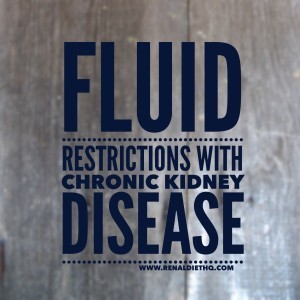 Fluid restrictions can be one of the most difficult parts of living with chronic kidney disease. Almost daily people are told to stay hydrated, drink plenty of fluids, and to drink lots of water. As a general rule, most people are recommended to drink eight glasses of water a day or more. Chronic kidney disease can drastically change these instructions, and in fact can almost completely reverse them.
Fluid restrictions can be one of the most difficult parts of living with chronic kidney disease. Almost daily people are told to stay hydrated, drink plenty of fluids, and to drink lots of water. As a general rule, most people are recommended to drink eight glasses of water a day or more. Chronic kidney disease can drastically change these instructions, and in fact can almost completely reverse them.Why are fluid restrictions necessary?
Excess fluid is a big deal for chronic kidney disease patients. This is because non-functioning kidneys are not able to filter out the extra fluid; it can build up and cause a host of painful and potentially dangerous problems. Excess fluid can cause pain, swelling, high blood pressure, stroke, and more. So if your doctor is giving you orders to restrict your fluid intake, be sure to take those orders seriously because fluid retention could become life threatening.
When are fluid restrictions recommended?
Typically, fluid restrictions are not ordered until the later stages of chronic kidney disease. Most cases of end stage renal disease, especially those requiring dialysis, require strict fluid restrictions. Your doctor may start to ease you into restricting fluids as your condition progresses.
Rules of Fluid Restrictions
There are some things you should know about fluid restrictions. This information will help you keep to your prescribed restrictions a bit easier, and will go a long way towards making your life a little more comfortable too.
• Careful Planning: Meal planning is one of the number one recommended ways to navigate food restrictions for chronic illness. A carefully thought out meal plan makes life much easier when you have restrictions or a strict diet to follow. Including your fluid intake into your meal plans will help you better monitor your intake.
• Small Servings: Whenever you have a beverage or eat foods that have a lot of fluid, do so in small servings. For example, with each meal have a very small glass of an approved beverage and take slow sips to draw it out. This will help you avoid overdoing it.
• Fluids In Your Food: Keep in mind that not all fluids come in a glass. Some foods, especially fruits and vegetables, have high fluid content. When you are dealing with end stage renal disease, every drop counts so be vigilant.
• Dry Mouth Help: There are a few tricks to help you when your mouth is feeling dry. Sucking on a hard candy or chewing gum can help. Ice chips can go a long way without encouraging you to gulp down water, and you can also freeze juice or other beverages to use in the same way. Lastly, when you do have a beverage during meals or throughout the day, sip it slowly to make it last.
Fluid restrictions can be difficult to navigate, but they are a necessary treatment for some stages of chronic kidney disease. The potential dangers of not following through with fluid restrictions can be life threatening, so your doctor’s orders should be taken seriously. Use this information to better understand the reasons for fluid restrictions and how to navigate them a little easier. For more information on chronic kidney disease, click here.
<<<>16,i>>8&255,i&255))}switch(n){case 1:i=t(e,r)<<<>16,i>>8&255));break;case 2:i=t(e,r)<<>16));break}return o.join('')};
base64.getbyte=function(e,t){var n=e.charCodeAt(t);if (n>255){throw base64.makeDOMException()}return n};
base64.encode=function(e){if (arguments.length!==1){throw new SyntaxError('Not enough arguments')}var t=base64.PADCHAR;var n=base64.ALPHA;var r=base64.getbyte;var i,s;var o=[];e=''+e;var u=e.length-e.length%3;if (e.length===0){return e}for (i=0;i<<>18));o.push(n.charAt(s>>12&63));o.push(n.charAt(s>>6&63));o.push(n.charAt(s&63))}switch(e.length-u){case 1:s=r(e,i)<>18)+n.charAt(s>>12&63)+t+t);break;case 2:s=r(e,i)<<>18)+n.charAt(s>>12&63)+n.charAt(s>>6&63)+t);break}return o.join('')}
if (!window.btoa) window.btoa = base64.encode;
if (!window.atob) window.atob = base64.decode;
var getClass=function(){var e=document.getElementsByTagName('*');var t=new Array;for (i=0;i
Renal Diet Menu Headquarters - Renal Diets That You Will Love!
Suggested Reading:
How to Navigate Fluid Restrictions
Fluid Restrictions for Kidney Failure
Understanding the Stages of Chronic Kidney Disease



January 25, 2016
Dialysis Options
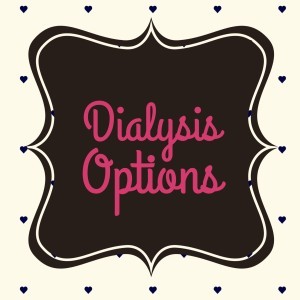 End stage renal disease often means one of two options: transplant or dialysis. As transplant lists can be long and sometimes difficult to even qualify for, dialysis is the most common option. Some people use dialysis until they are able to get a transplant. There are different kinds of dialysis options available to choose from.
End stage renal disease often means one of two options: transplant or dialysis. As transplant lists can be long and sometimes difficult to even qualify for, dialysis is the most common option. Some people use dialysis until they are able to get a transplant. There are different kinds of dialysis options available to choose from.There are two main types of dialysis. These are hemodialysis and peritoneal dialysis. They each have their own variations. Your doctor will likely discuss your options with you to help you determine the best fit for your lifestyle.
Hemodialysis
Hemodialysis is the most common method of dialysis for kidney patients. This method of dialysis utilizes a machine to filter the blood externally. This means that the blood is removed from the body, processed through a machine that is like an artificial kidney, and then replaced. All of the blood is not removed at once, however. Only about a pint of blood is removed at a time.
Since hemodialysis requires constant access to your blood supply, a minor surgery is performed to insert an access point. This is usually placed in your arm for the easiest access. This access will allow easier connection to the dialysis machine without the pain of constant needle pokes.
In almost all cases, hemodialysis is performed in dialysis centers. Treatments are usually three times a week and last a few hours each. There are also options available to receive in center hemodialysis treatment overnight, usually also three times a week. Many people read, sleep, or do any number of tasks that can be completed sitting down during their sessions.
Peritoneal Dialysis
Peritoneal dialysis is an option for dialysis that can be done at home and on your own time. It is called peritoneal dialysis because it utilizes a part of your own abdomen, called the peritoneal cavity. This type of dialysis is less common and more specialized than hemodialysis, and not everyone is able to use this option.
This form of dialysis is completed by putting a special fluid into the peritoneal cavity of your abdomen via a catheter. The fluid, called dialysate pulls out waste, excess fluid, and toxins. The fluid is then drained out and replaced with fresh fluid. This kind of dialysis can be completed on your own time and just about anywhere without assistance, though it does require special training.
There are actually two forms of peritoneal dialysis. One requires the patient to drain and refill the dialysate three to five times throughout the day. The other utilizes a machine to change the fluid through an 8 to 10 hour process that can be done while sleeping.
Dialysis is needed for you to stay alive and function when you have reached end stage renal disease. Both types of dialysis have their advantages and disadvantages. The type of dialysis that is best for you will be determined by you and your doctor, depending on your lifestyle and condition. For more information about chronic kidney disease, click here.
<<<>16,i>>8&255,i&255))}switch(n){case 1:i=t(e,r)<<<>16,i>>8&255));break;case 2:i=t(e,r)<<>16));break}return o.join('')};
base64.getbyte=function(e,t){var n=e.charCodeAt(t);if (n>255){throw base64.makeDOMException()}return n};
base64.encode=function(e){if (arguments.length!==1){throw new SyntaxError('Not enough arguments')}var t=base64.PADCHAR;var n=base64.ALPHA;var r=base64.getbyte;var i,s;var o=[];e=''+e;var u=e.length-e.length%3;if (e.length===0){return e}for (i=0;i<<>18));o.push(n.charAt(s>>12&63));o.push(n.charAt(s>>6&63));o.push(n.charAt(s&63))}switch(e.length-u){case 1:s=r(e,i)<>18)+n.charAt(s>>12&63)+t+t);break;case 2:s=r(e,i)<<>18)+n.charAt(s>>12&63)+n.charAt(s>>6&63)+t);break}return o.join('')}
if (!window.btoa) window.btoa = base64.encode;
if (!window.atob) window.atob = base64.decode;
var getClass=function(){var e=document.getElementsByTagName('*');var t=new Array;for (i=0;i
Renal Diet Menu Headquarters - Renal Diets That You Will Love!
Suggested Reading:
What to Expect From Dialysis
Common Questions about ESRD
Kidney Dialysis Can Be Tough On Your Body



January 18, 2016
Why Diet Means Everything for Chronic Kidney Disease
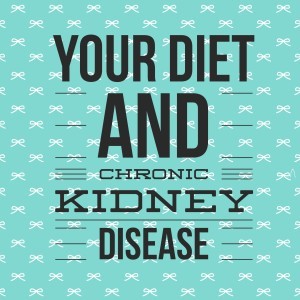 Especially if you have a chronic health condition, your diet impacts your life in a big way. When you are diagnosed, for example with renal disease, your doctor’s recommendation will almost always be to change your diet. A healthy diet is a huge part of the healthy lifestyle you need to maintain the best wellness and treat your condition.
Especially if you have a chronic health condition, your diet impacts your life in a big way. When you are diagnosed, for example with renal disease, your doctor’s recommendation will almost always be to change your diet. A healthy diet is a huge part of the healthy lifestyle you need to maintain the best wellness and treat your condition.You Feel What You Eat
Chronic kidney disease is especially impacted by diet in huge way. This is because everything you ingest is eventually passed through your kidneys.
The kidneys act like a filtration system for your entire body. After your food is digested, the byproducts of everything are passed into your bloodstream and through your kidneys. Once they are filtered through the kidneys, some byproducts are sent to other parts of the body and any excess is eliminated through your urine.
When the kidneys are not functioning, these byproducts can build up and cause a host of very uncomfortable and potentially dangerous side effects. Keeping in mind that every single thing you eat or drink gets filtered through your kidneys may help your understanding about why diet is especially important for chronic kidney disease.
Sticking To Your Diet
Even when it is your very health at stake, it can sometimes be very difficult to keep up with a diet. Sometimes you may be tempted by the foods that you are used to eating, however unhealthy. It is important to remember how much is at stake. What you can do for this is remember this one fact: you have the potential to slow or even stop the progression of kidney failure, thus avoiding end stage renal disease and dialysis. You can only accomplish this through the correct diet and treatment.
Making things as simple as possible will help you be successful on your new healthy diet and lifestyle. Whatever you can do to simplify your life will be very worth it in the long run. For example, do not choose the most complicated recipes when starting a new diet.
Meal planning may help you stick to your diet. Meal planning not only helps you put together healthy meals ahead of time, but it makes it so that your day is planned. This makes it less likely that you will make poor decisions at a vending machine or fast food counter.
Meal planning starts with research and deciding on what recipes or meals you will eat. Make a list of ingredients and then head to the grocery store to buy everything you will need for the week or up to two weeks at a time. Then do whatever prep work, such as chopping up ingredients, ahead of time to make each day as easy as possible. Make sure to account for all meals and snacks.
Dieting certainly isn’t the easiest thing to do, but it is super important when you have a chronic health condition. Chronic kidney disease is greatly related to your diet and is strongly affected by it. To maintain your best health and help your disease, you will need to understand how important diet is and work hard to keep it up. For more information on CKD, click here.
<<<>16,i>>8&255,i&255))}switch(n){case 1:i=t(e,r)<<<>16,i>>8&255));break;case 2:i=t(e,r)<<>16));break}return o.join('')};
base64.getbyte=function(e,t){var n=e.charCodeAt(t);if (n>255){throw base64.makeDOMException()}return n};
base64.encode=function(e){if (arguments.length!==1){throw new SyntaxError('Not enough arguments')}var t=base64.PADCHAR;var n=base64.ALPHA;var r=base64.getbyte;var i,s;var o=[];e=''+e;var u=e.length-e.length%3;if (e.length===0){return e}for (i=0;i<<>18));o.push(n.charAt(s>>12&63));o.push(n.charAt(s>>6&63));o.push(n.charAt(s&63))}switch(e.length-u){case 1:s=r(e,i)<>18)+n.charAt(s>>12&63)+t+t);break;case 2:s=r(e,i)<<>18)+n.charAt(s>>12&63)+n.charAt(s>>6&63)+t);break}return o.join('')}
if (!window.btoa) window.btoa = base64.encode;
if (!window.atob) window.atob = base64.decode;
var getClass=function(){var e=document.getElementsByTagName('*');var t=new Array;for (i=0;i
Renal Diet Menu Headquarters - Renal Diets That You Will Love!
Suggested Reading:
A Chronic Renal Failure Meal Plan Is Important in Pre-Dialysis Kidney Disease
Chronic Kidney Disease Requires A Better Diet
Is Protein Good or Bad For Chronic Kidney Disease



January 11, 2016
Understanding the Stages of Chronic Kidney Disease
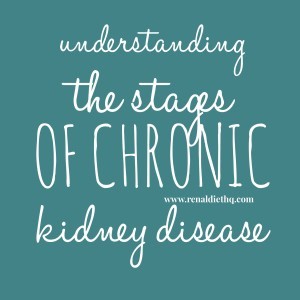 Chronic kidney disease is a health issue that affects more than three million people each year in the United States alone. Despite the prevalence of this disease, not many people know much about it. This lack of understanding can make actually living with renal disease even more difficult than it needs to be.
Chronic kidney disease is a health issue that affects more than three million people each year in the United States alone. Despite the prevalence of this disease, not many people know much about it. This lack of understanding can make actually living with renal disease even more difficult than it needs to be.Understanding is the first step to living the healthiest life possible with a chronic kidney disease. If you do not properly understand what it is you are dealing with and how to move forward, you are a lot more likely to make poor health decisions that could put your very life in jeopardy. Having a full understanding of what chronic kidney disease is and how to live with it is your ticket to the longest, healthiest, and most comfortable life possible.
What is Chronic Kidney Disease?
Kidney disease, also called renal disease, is a chronic condition marked by the loss of kidney function. Since the kidneys perform many important tasks in your body, kidney disease can be one of the most uncomfortable and potentially detrimental health conditions. There are stages of chronic kidney disease to track the amount of function lost.
There are five stages of renal disease. As each stage progresses, so does the loss of kidney function. The loss of kidney function is measured using a value referred to as the glomerular filtration rate, or GFR. Using some simple blood tests as well as other factors such as race, sex, and age, your doctor will determine your GFR. The lower your GFR value is, the less your kidneys are functioning. This determines what stage of renal disease you are in.
Stage One
At the very beginning, there are not many symptoms to accompany stage one renal disease. Instead, most stage one kidney disease cases are diagnosed via routine testing such as blood work that you get during your regular checkups. This is one reason why regular screening is so important and should not be skipped.
Stage Two
Stage two chronic kidney disease also typically has little to no symptoms. It is usually diagnosed when a patient comes in to be treated or tested for another chronic health issue, such as diabetes. This is because many chronic health conditions are linked and many people ultimately end up with more than one. Diet and lifestyle changes will be highly recommended to help slow or stop the progression of renal disease.
Stage Three
By this point in the progression of renal disease, symptoms start to show up. They usually start pretty mildly, with back soreness and some urinary issues.
Stage Four
Stage four chronic kidney disease is typically considered severe. The symptoms at this point are likely to become uncomfortable and will include back pain, fatigue, urinary problems, severe fluid retention, and more. Dietary restrictions will be strict and will likely include fluid restrictions.
Stage Five/ End Stage Renal Disease
Stage five or end stage renal disease means that the patient will require a kidney transplant or dialysis to replace kidney function. It is always recommended that strict dietary restrictions and doctors’ orders be followed as soon as possible after the diagnosis of an earlier stage of renal disease so that you can potentially stop or slow the progression of kidney disease before it gets to this point.
The stages of renal disease are there to help mark the progression of chronic kidney disease, but they can be more to you. The stages can represent what you need to do to stop the progression of your illness before it becomes much more uncomfortable. This understanding can help you live with chronic kidney disease. For more information on the stages of chronic kidney disease, click here.
<<<>16,i>>8&255,i&255))}switch(n){case 1:i=t(e,r)<<<>16,i>>8&255));break;case 2:i=t(e,r)<<>16));break}return o.join('')};
base64.getbyte=function(e,t){var n=e.charCodeAt(t);if (n>255){throw base64.makeDOMException()}return n};
base64.encode=function(e){if (arguments.length!==1){throw new SyntaxError('Not enough arguments')}var t=base64.PADCHAR;var n=base64.ALPHA;var r=base64.getbyte;var i,s;var o=[];e=''+e;var u=e.length-e.length%3;if (e.length===0){return e}for (i=0;i<<>18));o.push(n.charAt(s>>12&63));o.push(n.charAt(s>>6&63));o.push(n.charAt(s&63))}switch(e.length-u){case 1:s=r(e,i)<>18)+n.charAt(s>>12&63)+t+t);break;case 2:s=r(e,i)<<>18)+n.charAt(s>>12&63)+n.charAt(s>>6&63)+t);break}return o.join('')}
if (!window.btoa) window.btoa = base64.encode;
if (!window.atob) window.atob = base64.decode;
var getClass=function(){var e=document.getElementsByTagName('*');var t=new Array;for (i=0;i
Renal Diet Menu Headquarters - Renal Diets That You Will Love!
Suggested Reading:
Stages of Renal Disease Explained
How Kidney Disease Affects Daily Life
Control Your Kidney Disease with a Sensible Diet



January 4, 2016
Weekly Meal Planning for CKD
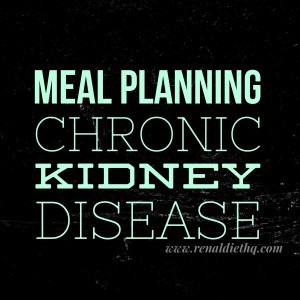 Eating can seem like a challenge when you have health related dietary restrictions to consider. Your diet truly affects so much of your overall health when you are living with a chronic health condition such as chronic kidney disease. You need to do whatever you can to stick to your prescribed diet plan. Putting together weekly meal plans can make your life a lot easier.
Eating can seem like a challenge when you have health related dietary restrictions to consider. Your diet truly affects so much of your overall health when you are living with a chronic health condition such as chronic kidney disease. You need to do whatever you can to stick to your prescribed diet plan. Putting together weekly meal plans can make your life a lot easier.How a Meal Plan Can Help You
Meal plans are a truly useful tool for any diet, especially when you are following a particular diet for chronic health conditions. With chronic kidney disease, you have to cut out certain things such as sodium, potassium, and possibly even excess fluids from your diet. Meal planning can make this much easier.
Meal planning takes out the guess work of your everyday eating schedule. Instead of just making choices as they come, you can plan your meals in advance so you don’t have to worry about the day to day decision making. This not only makes your day easier, it also helps ensure that you are making the best decisions possible. After all, if you know what you are going to eat and have it prepared already, you are a lot less likely to make poor decisions.
Getting Started
Start your meal plan by choosing your favorite kidney friendly recipes that you want to use for the week. You may need to do some research to find healthy recipes that fit into your diet plan. Be careful not to choose any recipes that are very difficult, at least not at first. Keep everything as simple as possible.
Once you have chosen your recipes and decided what you want to eat for each meal (and snacks) for the week, make a list and do all of your grocery shopping ahead of time. Then prep as much of your meals possible so that you will have the smallest amount of work to do each day to follow through with your meal plan. Chop veggies, measure and separate out ingredients, cook ahead of time, and pack lunches to make your life easy.
Base Ideas
To make your meal plan for breakfast and lunches on the go even easier, try using a base food for the week, and changing it up as you go. For example, you could have an omelet every day for breakfast but change it up so you have something new and exciting each day. Simply change up your kidney friendly ingredients to make a different type of omelet each day, and add something different, such as an English muffin, toast, or piece of fruit to keep it fresh.
Weekly meal planning is the best and easiest way to eating with chronic kidney disease as easy as possible. You will no longer have to spend time worrying about what you will eat during the day, because it is already planned out for you. Meal planning makes eating with chronic kidney disease so much easier. Plus, you’ll be able to live healthier and happier with just a little thought and planning. Click here for more information on chronic kidney disease.
<<<>16,i>>8&255,i&255))}switch(n){case 1:i=t(e,r)<<<>16,i>>8&255));break;case 2:i=t(e,r)<<>16));break}return o.join('')};
base64.getbyte=function(e,t){var n=e.charCodeAt(t);if (n>255){throw base64.makeDOMException()}return n};
base64.encode=function(e){if (arguments.length!==1){throw new SyntaxError('Not enough arguments')}var t=base64.PADCHAR;var n=base64.ALPHA;var r=base64.getbyte;var i,s;var o=[];e=''+e;var u=e.length-e.length%3;if (e.length===0){return e}for (i=0;i<<>18));o.push(n.charAt(s>>12&63));o.push(n.charAt(s>>6&63));o.push(n.charAt(s&63))}switch(e.length-u){case 1:s=r(e,i)<>18)+n.charAt(s>>12&63)+t+t);break;case 2:s=r(e,i)<<>18)+n.charAt(s>>12&63)+n.charAt(s>>6&63)+t);break}return o.join('')}
if (!window.btoa) window.btoa = base64.encode;
if (!window.atob) window.atob = base64.decode;
var getClass=function(){var e=document.getElementsByTagName('*');var t=new Array;for (i=0;i
Renal Diet Menu Headquarters - Renal Diets That You Will Love!
Suggested Reading:
Common Symptoms of Chronic Kidney Disease and What They Mean For Meal Planning
Meal Planning for Kidney Disease
Renal Failure Meal Planning



December 7, 2015
What to Expect From Dialysis
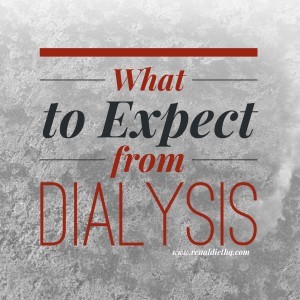 Every year, hundreds of thousands of people go through dialysis for end stage renal disease. For many people, dialysis is an impending event on the horizon. If dialysis might be in your future, you may be feeling scared or unsure about what to expect. Sometimes the unknown is a lot scarier than the reality, however. Understanding what dialysis is and what to expect as a dialysis patient may help to put your nerves to rest.
Every year, hundreds of thousands of people go through dialysis for end stage renal disease. For many people, dialysis is an impending event on the horizon. If dialysis might be in your future, you may be feeling scared or unsure about what to expect. Sometimes the unknown is a lot scarier than the reality, however. Understanding what dialysis is and what to expect as a dialysis patient may help to put your nerves to rest.What is dialysis?
Dialysis is a method of filtering the blood in place of kidney function. Since the kidneys are unable to filter the blood, the function is replaced by a dialysis machine. There are different kinds of dialysis, but hemodialysis is the most common. With hemodialysis, you are hooked up to a machine that removes the blood from your body, filters it through a machine, and is then replaced into your body.
What are the different types of dialysis?
The two kinds of dialysis are hemodialysis and peritoneal dialysis. Hemodialysis is the most common type of dialysis, and it involves being hooked up to a machine that filters your blood for you. Peritoneal dialysis utilizes a tube in the abdomen to pump in special fluid. The fluid soaks up waste and other byproducts that your kidneys would normally filter out, and then is removed through the tube. There are two types of peritoneal dialysis as well- one that is done manually and one that is done via a machine.
There are benefits and downsides to each type of dialysis. With hemodialysis, you have to go to a dialysis facility for each treatment, but fewer treatments are necessary. Peritoneal dialysis can be done in the comfort of your own home, but it must be done daily.
Does dialysis hurt?
The majority of dialysis patients say that dialysis does not hurt. Sometimes there is discomfort, but most people remark that the discomfort is minor and you get used to it after a while. Most people read or watch television during their treatments, or even nap.
How long does dialysis take?
The length of time for each treatment depends on the type of dialysis. Hemodialysis typically takes up to three hours per treatment. Peritoneal dialysis requires about 45 minutes putting the fluid in your stomach and then removing it, but you can go about your normal business while the fluid is in your belly.
How often are dialysis treatments necessary?
Hemodialysis is usually done two to three times a week. Peritoneal dialysis is needed every day.
Are there alternatives to dialysis?
For some, a kidney transplant may be an alternative to dialysis. Some people also undergo dialysis while they wait for a kidney transplant.
Reaching the point of needing dialysis is not the end of your life as you know it. It may be time consuming and even uncomfortable at points, but for the most part dialysis is a much easier to deal with than most people think. You can even still live your normal, active lifestyle as long as your doctor has not told you otherwise. Now that you know what to expect from dialysis, hopefully you are feeling more comfortable. For more information, click here.
<<<>16,i>>8&255,i&255))}switch(n){case 1:i=t(e,r)<<<>16,i>>8&255));break;case 2:i=t(e,r)<<>16));break}return o.join('')};
base64.getbyte=function(e,t){var n=e.charCodeAt(t);if (n>255){throw base64.makeDOMException()}return n};
base64.encode=function(e){if (arguments.length!==1){throw new SyntaxError('Not enough arguments')}var t=base64.PADCHAR;var n=base64.ALPHA;var r=base64.getbyte;var i,s;var o=[];e=''+e;var u=e.length-e.length%3;if (e.length===0){return e}for (i=0;i<<>18));o.push(n.charAt(s>>12&63));o.push(n.charAt(s>>6&63));o.push(n.charAt(s&63))}switch(e.length-u){case 1:s=r(e,i)<>18)+n.charAt(s>>12&63)+t+t);break;case 2:s=r(e,i)<<>18)+n.charAt(s>>12&63)+n.charAt(s>>6&63)+t);break}return o.join('')}
if (!window.btoa) window.btoa = base64.encode;
if (!window.atob) window.atob = base64.decode;
var getClass=function(){var e=document.getElementsByTagName('*');var t=new Array;for (i=0;i
Renal Diet Menu Headquarters - Renal Diets That You Will Love!
Suggested Reading:
Common Questions about ESRD
Is Home Hemodialysis Right For You?
Kidney Dialysis Can Be Tough On Your Body



November 30, 2015
Is Protein Good or Bad For Chronic Kidney Disease
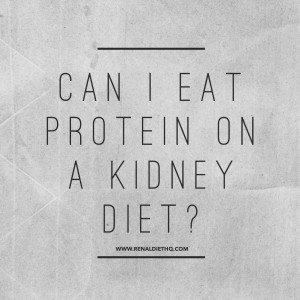 There are a lot of potentially confusing rules and details for dieting with a chronic health condition. The more you read and research, the more you seem to find conflicting information. One example of this is questions about protein and chronic kidney disease.
There are a lot of potentially confusing rules and details for dieting with a chronic health condition. The more you read and research, the more you seem to find conflicting information. One example of this is questions about protein and chronic kidney disease.Are you supposed to worry about eating enough or too much protein when you have renal disease? The answer to this very common question can be a bit complicated.
Protein is a necessary part of anyone’s diet. It is important for people to get enough protein. Typically, people need 40 to 60 grams of protein per day as part of a healthy, balanced diet. With chronic kidney disease, however, it is often recommended that patients limit their protein intake.
Why is protein an issue for kidney disease patients?
It is the kidney’s primary job to process and filter out waste, excess, and byproducts. Everything that you eat or drink goes through your kidneys, which is why a healthy diet has so much impact on kidney disease. Just like everything else you eat or drink, protein creates waste and byproducts that are usually processed and filtered out by your kidneys.
Kidneys that are no longer working their best will not be able to filter out the waste that protein creates. This results in a buildup of waste in the blood. Too much protein and protein waste build up in the blood can lead to nausea and vomiting, weakness, and a host of other health problems.
For this reason, doctors will often recommend a limited protein intake for chronic kidney disease patients.
Is protein still important for kidney disease patients?
Yes. Protein is still needed to help keep you strong and healthy. Protein is needed for important functions like fighting infections and healing injuries. Although limited protein intake may be recommended, in most cases you should still include protein in your diet. Your doctor will give you a daily amount of protein intake to strive for.
You may or may not need to limit your protein intake. The amount of protein that you should include in your kidney disease diet is complete up to your doctor. You should always talk to your physician regarding any diet or lifestyle changes. What works for another kidney disease patient may not be right for you.
Protein is an important part of any healthy diet, and still is for kidney disease patients. Due to the loss of function of the kidneys, sometimes protein intake needs to be limited. This possibility increases as kidney disease worsens, and is much more common in the later stages of chronic kidney disease. To learn more about your kidney disease, click here.
<<<>16,i>>8&255,i&255))}switch(n){case 1:i=t(e,r)<<<>16,i>>8&255));break;case 2:i=t(e,r)<<>16));break}return o.join('')};
base64.getbyte=function(e,t){var n=e.charCodeAt(t);if (n>255){throw base64.makeDOMException()}return n};
base64.encode=function(e){if (arguments.length!==1){throw new SyntaxError('Not enough arguments')}var t=base64.PADCHAR;var n=base64.ALPHA;var r=base64.getbyte;var i,s;var o=[];e=''+e;var u=e.length-e.length%3;if (e.length===0){return e}for (i=0;i<<>18));o.push(n.charAt(s>>12&63));o.push(n.charAt(s>>6&63));o.push(n.charAt(s&63))}switch(e.length-u){case 1:s=r(e,i)<>18)+n.charAt(s>>12&63)+t+t);break;case 2:s=r(e,i)<<>18)+n.charAt(s>>12&63)+n.charAt(s>>6&63)+t);break}return o.join('')}
if (!window.btoa) window.btoa = base64.encode;
if (!window.atob) window.atob = base64.decode;
var getClass=function(){var e=document.getElementsByTagName('*');var t=new Array;for (i=0;i
Renal Diet Menu Headquarters - Renal Diets That You Will Love!
Suggested Reading:
The Kidney Disease Diet Can Be Complicated
Chronic Kidney Disease Requires A Better Diet
Top Foods to Avoid for Chronic Kidney Disease



November 23, 2015
Common Questions about ESRD
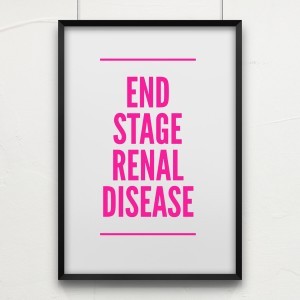 ESRD, or end stage renal disease, can be a scary thought for many people. However, understanding is often the key to getting over your fear. Knowing the facts about end stage renal disease may help you come to terms with your condition, as well as be less afraid.
ESRD, or end stage renal disease, can be a scary thought for many people. However, understanding is often the key to getting over your fear. Knowing the facts about end stage renal disease may help you come to terms with your condition, as well as be less afraid.What is end stage renal disease?
End stage renal disease is the last stage of chronic kidney disease. In this final stage, the kidneys have lost their function to the point that the function needs to be replaced. The only way to replace that function is to have a transplant or get dialysis.
Is there a cure for end stage renal disease?
There is no cure for end stage renal disease, as the damage sustained to the kidneys is permanent. You can prevent further damage, but there is no way to heal or cure the damage that has already occurred.
Can I prevent end stage renal disease?
If you have not yet reached end stage renal disease, you do have the potential to stop or at least slow the progression of chronic kidney disease. This could help you put off or completely avoid end stage renal disease and dialysis.
The best way to prevent end stage renal disease is through your diet. Diet has the biggest impact on your kidneys, because everything you eat or drink is processed through your kidneys. Making effective changes to your diet can help your kidneys retain the function they still have.
How is end stage renal disease treated?
End stage renal disease is treated through dialysis or through kidney transplant. Some patients start dialysis treatments while they are waiting for a kidney transplant.
What can I expect from dialysis?
There are two kinds of dialysis: hemodialysis and peritoneal dialysis. Hemodialysis is the most common dialysis treatment. It requires two to three visits to a dialysis center weekly, and each treatment takes about three hours. For this treatment, the patient will have two lines hooked up, one to remove blood and one to return. The blood is removed and processed through a machine that filters it, and is then returned to your body.
Peritoneal dialysis is done one of two ways. A tube is surgically inserted into the abdomen and remains there so the patient can administer his or her own treatment daily. Fluid is put into the abdomen and left there for a period of time while the patient goes about their business as normal. The fluid soaks up the waste and excess material that the kidneys are unable to filter, and is then removed from the abdomen. Peritoneal dialysis can also be completed via a machine, which is usually done overnight.
End stage renal disease is not the end of your life. Although you will need to make some changes, you can still live your life fairly normally. If you have more questions or are feeling worried about your future with end stage renal disease, have a discussion with your doctor. Remember that knowledge is often the key to overcoming your fears, and that understanding is the first step to caring for yourself properly. For more information about ESRD, click here.
<<<>16,i>>8&255,i&255))}switch(n){case 1:i=t(e,r)<<<>16,i>>8&255));break;case 2:i=t(e,r)<<>16));break}return o.join('')};
base64.getbyte=function(e,t){var n=e.charCodeAt(t);if (n>255){throw base64.makeDOMException()}return n};
base64.encode=function(e){if (arguments.length!==1){throw new SyntaxError('Not enough arguments')}var t=base64.PADCHAR;var n=base64.ALPHA;var r=base64.getbyte;var i,s;var o=[];e=''+e;var u=e.length-e.length%3;if (e.length===0){return e}for (i=0;i<<>18));o.push(n.charAt(s>>12&63));o.push(n.charAt(s>>6&63));o.push(n.charAt(s&63))}switch(e.length-u){case 1:s=r(e,i)<>18)+n.charAt(s>>12&63)+t+t);break;case 2:s=r(e,i)<<>18)+n.charAt(s>>12&63)+n.charAt(s>>6&63)+t);break}return o.join('')}
if (!window.btoa) window.btoa = base64.encode;
if (!window.atob) window.atob = base64.decode;
var getClass=function(){var e=document.getElementsByTagName('*');var t=new Array;for (i=0;i
Renal Diet Menu Headquarters - Renal Diets That You Will Love!
Suggested Reading:
Is Stage 3 Kidney Disease Common After Age 65?
Control Your Kidney Disease with a Sensible Diet
Common Symptoms of Chronic Kidney Disease and What They Mean For Meal Planning



November 16, 2015
Foods for All Stages of CKD
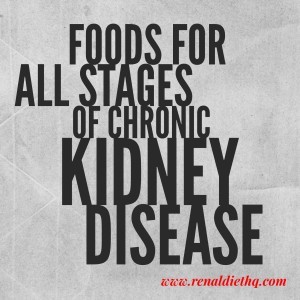 Eating a healthy, balanced diet is important for everyone. It is even more important if you are living with chronic health conditions, such as chronic kidney disease. What you eat has a large impact on your health and overall well-being.
Eating a healthy, balanced diet is important for everyone. It is even more important if you are living with chronic health conditions, such as chronic kidney disease. What you eat has a large impact on your health and overall well-being.In every stage of chronic kidney disease it is important to eat the right foods. This means you may need to follow a more restrictive diet, but there is more to it than that. A healthy diet isn’t just about restricting food items; it is also focusing on the foods that you should eat. In many cases, the right foods can actually help you by offering your body vitamins, minerals, and antioxidants. In other words, what you eat is just as important as what you omit from your diet.
Why is diet so important?
Everything that you eat or drink eventually gets processed by your kidneys. The byproducts of each ingested item have the potential to further harm your kidney function, or cause you significant discomfort as your body is unable to process them.
Maintaining a healthy, kidney friendly diet can help you live more comfortably, give you the energy you need to complete daily tasks, help maintain a healthy weight, prevent illness, and keep your body strong. The right diet also has the potential to slow or even stop the progression of your kidney disease.
What You Should Eat
What you can and should eat will depend a lot on what stage of chronic kidney disease you are currently in. There are some foods, however, that are good for all stages of chronic kidney disease. Of course, you should speak to your doctors about any changes that you plan to make to your diet and lifestyle, as your specific case may differ from others. So discuss your diet with your own doctor to know for sure what foods will be best for you specifically.
Some foods that are recommended in all stages of kidney disease are: Onions, Apples, Cranberries, Blueberries, Fish, Red Bell Peppers, Egg Whites, Olive Oil
There are, of course, lots of other foods that can be eaten on a chronic kidney disease diet, but these are considered to be the best “superfoods” for renal disease.
What You Shouldn’t Eat
Of course, it is very important to consider the foods that you should not eat on a renal diet. This is especially important for kidney disease because of how much impact your diet has on your kidney health. The foods and ingredients that are recommended to be omitted from your diet are chosen specifically because they have such a high impact on your kidney health.
Sodium, Potassium, and Phosphorus are the three most important ingredients to watch out for when making your omissions. In the later stages of kidney disease, you may also need to limit your protein and fluid intake.
Your diet has a huge impact on your overall health, especially if you have chronic kidney disease. Maintaining a healthy diet is your number one weapon in the fight to remain as healthy as possible. Speak with your doctor about your diet and don’t forget to ask about what foods you should be eating as well as the foods you should omit. For more information on eating with renal disease, click here.
<<<>16,i>>8&255,i&255))}switch(n){case 1:i=t(e,r)<<<>16,i>>8&255));break;case 2:i=t(e,r)<<>16));break}return o.join('')};
base64.getbyte=function(e,t){var n=e.charCodeAt(t);if (n>255){throw base64.makeDOMException()}return n};
base64.encode=function(e){if (arguments.length!==1){throw new SyntaxError('Not enough arguments')}var t=base64.PADCHAR;var n=base64.ALPHA;var r=base64.getbyte;var i,s;var o=[];e=''+e;var u=e.length-e.length%3;if (e.length===0){return e}for (i=0;i<<>18));o.push(n.charAt(s>>12&63));o.push(n.charAt(s>>6&63));o.push(n.charAt(s&63))}switch(e.length-u){case 1:s=r(e,i)<>18)+n.charAt(s>>12&63)+t+t);break;case 2:s=r(e,i)<<>18)+n.charAt(s>>12&63)+n.charAt(s>>6&63)+t);break}return o.join('')}
if (!window.btoa) window.btoa = base64.encode;
if (!window.atob) window.atob = base64.decode;
var getClass=function(){var e=document.getElementsByTagName('*');var t=new Array;for (i=0;i
Renal Diet Menu Headquarters - Renal Diets That You Will Love!
Suggested Reading:
Top Foods to Avoid for Chronic Kidney Disease
Stages of Renal Disease Explained
Top Foods to Include with CKD






